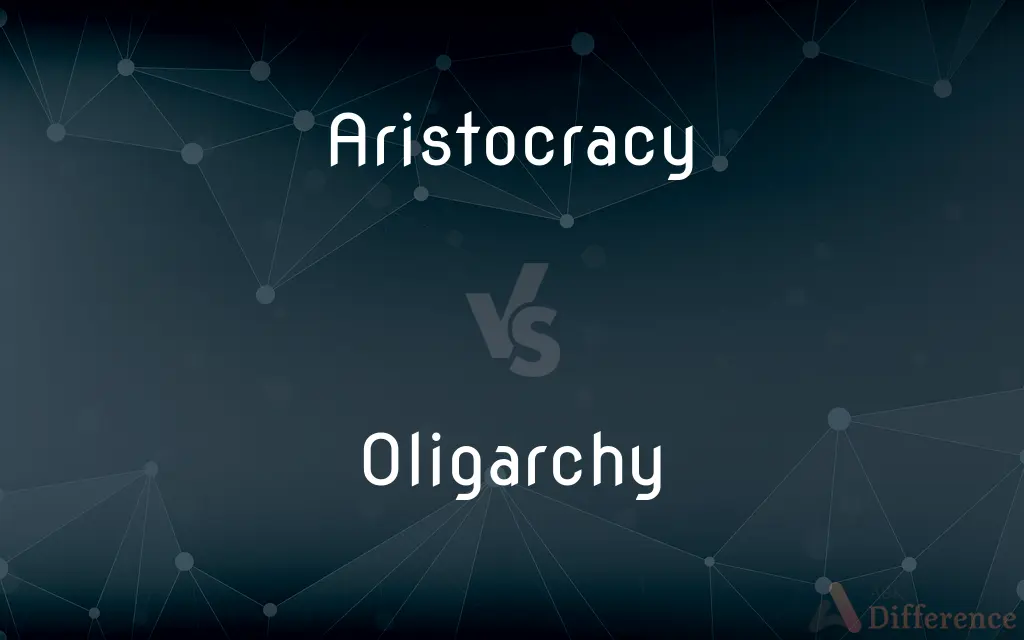Aristocracy vs. Oligarchy — What's the Difference?
By Tayyaba Rehman — Updated on October 12, 2023
Aristocracy is rule by the noble or elite class based on birth or privilege, while oligarchy is rule by a small, often wealthy, group regardless of nobility. Both signify limited power structures, but aristocracy emphasizes lineage.

Difference Between Aristocracy and Oligarchy
Table of Contents
ADVERTISEMENT
Key Differences
Aristocracy and oligarchy are both forms of governance characterized by rule by a select few. However, the basis for this selection differs between the two. Aristocracy traditionally implies rule by an elite class, distinguished by birth, nobility, or hereditary privilege. This system prioritizes lineage and often values the preservation of traditions, privileges, and status tied to familial descent.
Conversely, oligarchy signifies rule by a small group, and this group's power isn't necessarily based on noble birth or heritage. Instead, oligarchies often form due to control of resources, wealth, military strength, or other forms of influence. In essence, while an aristocracy might be an oligarchy if the nobility is few, not all oligarchies are aristocracies.
Historically, aristocracies were common in many societies where noble families or classes had inherent rights to governance or special privileges. These aristocratic systems could sometimes offer stability due to their structured nature and the defined roles of the nobility.
Oligarchies, on the other hand, can arise in various scenarios. They might evolve in societies transitioning from other forms of governance or emerge in power vacuums where a few individuals or entities can consolidate power. Oligarchies might not always provide the same stability as aristocracies, especially if the ruling group's interests conflict with those of the general populace.
In summary, while both aristocracy and oligarchy involve rule by a limited number, the distinction primarily revolves around the basis of this rule. Aristocracy focuses on nobility and lineage, while oligarchy emphasizes a small group's control, often due to wealth or influence.
ADVERTISEMENT
Comparison Chart
Basis of Rule
Noble birth or hereditary privilege.
Small group, often based on wealth.
Historical Prevalence
Common in many traditional societies.
Can arise in various societal contexts.
Stability
Can offer stability due to structured nature.
Might vary based on the group's interests.
Inclusivity
Restricted to the nobility or elite by birth.
Restricted to a few, not always nobility.
Representative of
Lineage, tradition, and hereditary privilege.
Wealth, resources, or consolidated power.
Compare with Definitions
Aristocracy
A government form where power lies with a privileged few, often hereditary.
The aristocracy ensured their children were educated in the finest institutions.
Oligarchy
Rule by a few individuals, often due to wealth or influence.
The oligarchy ensured their businesses thrived at the expense of others.
Aristocracy
The highest social class in some societies, especially those holding hereditary titles.
The local aristocracy attended the grand ball.
Oligarchy
A system where decision-making is in the hands of a few.
The university's oligarchy made choices without consulting the student body.
Aristocracy
A privileged ruling class based on familial lineage.
The young prince was groomed to join the aristocracy.
Oligarchy
A power structure where a community's control rests with a small number of people.
The city's oligarchy was known to all, though never officially acknowledged.
Aristocracy
Rule by the noble or elite class, typically based on birth.
The kingdom was governed by an aristocracy with age-old traditions.
Oligarchy
A government form where a select group holds significant power, not always based on nobility.
The country transitioned to an oligarchy after the coup.
Aristocracy
Aristocracy (Greek: ἀριστοκρατία aristokratía, from ἄριστος aristos 'excellent', and κράτος, kratos 'rule') is a form of government that places strength in the hands of a small, privileged ruling class, the aristocrats. The term derives from the Greek aristokratia, meaning 'rule of the best'.At the time of the word's origins in ancient Greece, the Greeks conceived it as rule by the best-qualified citizens—and often contrasted it favorably with monarchy, rule by an individual.
Oligarchy
Government by a small group, especially for corrupt or selfish purposes.
The nation struggled under the control of the oligarchy.
Aristocracy
The highest class in certain societies, typically comprising people of noble birth holding hereditary titles and offices
Members of the aristocracy
Oligarchy
Oligarchy (from Greek ὀλιγαρχία (oligarkhía); from ὀλίγος (olígos) 'few', and ἄρχω (arkho) 'to rule or to command') is a form of power structure in which power rests with a small number of people. These people may or may not be distinguished by one or several characteristics, such as nobility, fame, wealth, education, corporate, religious, political, or military control.
Aristocracy
A hereditary ruling class; nobility.
Oligarchy
Government by a few, especially by a small faction of persons or families.
Aristocracy
Government by a ruling class.
Oligarchy
Those making up such a government.
Aristocracy
A state or country having this form of government.
Oligarchy
A state governed by a few persons.
Aristocracy
Government by the citizens deemed to be best qualified to lead.
Oligarchy
A government run by only a few, often the wealthy.
Aristocracy
A state having such a government.
Oligarchy
Those who make up an oligarchic government.
Aristocracy
A group or class considered superior to others.
Oligarchy
A state ruled by such a government.
Aristocracy
The nobility, or the hereditary ruling class.
Oligarchy
A form of government in which the supreme power is placed in the hands of a few persons; also, those who form the ruling few.
All oligarchies, wherein a few men domineer, do what they list.
Aristocracy
Government by such a class, or a state with such a government
Oligarchy
A political system governed by a few people
Aristocracy
A class of people considered (not normally universally) superior to others
Aristocracy
Government by the best citizens.
Aristocracy
A ruling body composed of the best citizens.
In the SenateRight not our quest in this, I will protest themTo all the world, no aristocracy.
Aristocracy
A form a government, in which the supreme power is vested in the principal persons of a state, or in a privileged order; an oligarchy.
The aristocracy of Venice hath admitted so many abuses, trough the degeneracy of the nobles, that the period of its duration seems approach.
Aristocracy
The nobles or chief persons in a state; a privileged class or patrician order; (in a popular use) those who are regarded as superior to the rest of the community, as in rank, fortune, or intellect.
Aristocracy
A privileged class holding hereditary titles
Aristocracy
The most powerful members of a society
Aristocracy
A group perceived as superior due to culture, education, or other qualities.
The literary aristocracy praised the new novel.
Common Curiosities
Can an aristocracy be considered a type of oligarchy?
Yes, if the noble or elite class is small, an aristocracy can be a type of oligarchy.
Are all oligarchies corrupt?
No, while some oligarchies might be corrupt, it's not an inherent characteristic of the system.
What is the primary basis for rule in an aristocracy?
Aristocracy bases its rule on noble birth or hereditary privilege.
Is aristocracy prevalent in modern societies?
While pure aristocratic systems are rare today, remnants exist in some constitutional monarchies.
Did many historical societies have aristocracies?
Yes, many traditional societies had systems where noble families held special privileges.
Does aristocracy always involve royalty?
No, while often associated with royal families, aristocracy can involve non-royal noble classes.
How does an oligarchy determine its rulers?
Oligarchy's rulers often emerge from a small group with wealth, influence, or control of resources.
Which system emphasizes lineage more?
Aristocracy emphasizes lineage and hereditary privilege.
Can an oligarchy be democratic?
While oligarchy inherently involves limited rule, it can coexist with certain democratic processes.
Can an oligarchy be based on something other than wealth?
Yes, oligarchies can form due to control of resources, military strength, or other forms of influence.
Are oligarchies always short-lived?
No, oligarchies can persist for extended periods, especially if they secure societal control.
How do people become part of an oligarchy?
Individuals often enter an oligarchy through wealth, influence, control of resources, or strategic alliances.
How do oligarchies typically arise?
Oligarchies can arise in power vacuums, societal transitions, or when a few consolidate power.
Which system is more inclusive?
Generally, both are exclusive, but aristocracy specifically restricts to nobility or birthright.
Which system might offer more stability historically?
Historically, aristocracies might have offered more stability due to their structured nature and defined roles.
Share Your Discovery

Previous Comparison
Raw vs. Row
Next Comparison
Decree vs. ProclamationAuthor Spotlight
Written by
Tayyaba RehmanTayyaba Rehman is a distinguished writer, currently serving as a primary contributor to askdifference.com. As a researcher in semantics and etymology, Tayyaba's passion for the complexity of languages and their distinctions has found a perfect home on the platform. Tayyaba delves into the intricacies of language, distinguishing between commonly confused words and phrases, thereby providing clarity for readers worldwide.















































